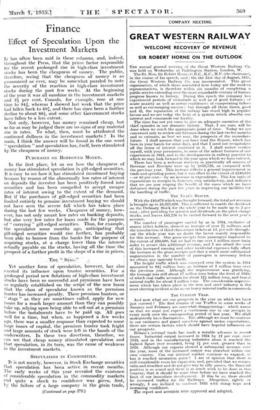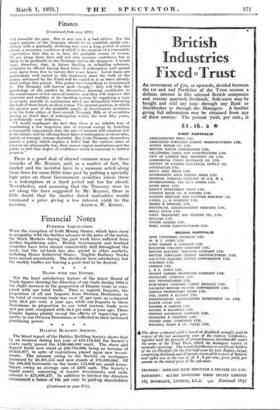Finance
Effect - of Speculation Upon the
Investment Markets •
IT has often been said in these columns, and, indeed, throughout the Press, that the prime factor responsible for the recent prolonged rise in high-class investment stocks has been the cheapness of money. The public, therefore, seeing; that the cheapness of money is as pronounced as ever, may be somewhat puzzled to note the severity of the reaction in high-class investment stocks during the past few weeks. At the beginning of the year it was all sunshine in the investment markets and 2i per cent. Consols, for example, rose at one time to 941, whereas I showed last week that the price had fallen back to 89k, and there has since been a further decline to about 881, and some other Government stocks have fallen to a less extent.
Not only, however, has money remained cheap, but so far as may be judged there are no signs of any material rise in rates. To what, then, must be attributed the continued dullness in the investment markets ? In the main, I think the answer will be found in the one word " speculation " and speculation has, itself, been stimulated by the cheapness of money. •
PURCHASES ON BORROWED MONEY.
In the first place, let us see how the cheapness of money has stimulated speculation in gilt-edged securities. It is easy to see how it has stimulated investment buying because by reason of the abnormally low rates of interest on deposits the investor has been positively forced into securities and has been compelled to accept meagre rates of interest owing to the extent of the demand. But if the purchases of gilt-edged securities had been limited entirely to genuine investment buying we should not have seen the severe fall which has taken place during the last few weeks. Cheapness of money, how. ever, has not only meant low rates on banking deposits; but also very low rates for loans made for the purpose of " carrying " gilt-edged securities. Thus, for example, the speculator some months ago, anticipating that seenrities would rise further, has probably been able to borrow from the banks for the purpose of acquiring stocks, at a charge lower than the interest actually payable on the stocks, having all the time the prospect of a further profit in the shape of a rise in prices, , TTrE " Silo." Yet another form of speculation, however, has also exerted its influence upon trustee securities. For a prolonged period new flotations of high-class investment stocks have been so successful and premiums have been so regularly established on the scrips of the new loanS that the class of speculator known as the premium hunter has increased greatly. These premium hunters, or " stags " as they are sometimes called, apply for new issues for a much larger amount than they can possibly take up, relying upon being able to sell out at a premium before the- instalments have to be paid' up. All goes well for a time, but when, as happened a few weeks ago, there was a smaller response than expected to some large issues of capital, the premium hunter took fright and large amounts of stock were left in the hands of the underwriters. In these two directions, therefore, we can see that cheap money stimulated speculation and that speculation, in its turn, was the cause of weakness in the investment markets. .
SPECULATION IN COMMODITIES.
It is not merely, however, in Stock Exchange securities that speculation has been active in recent months. The early weeks of this year • revealed the existence Of considerable speculation in the commodity markets and quite a shock to confidence was given, first, by the failure of a large company in 'the grain trade, (Continued on page 370.)
Finance
(Continued from page 369.) and, secondly, by the disclosure of large losses. arising out of the gamble in pepper. Now, whenever financial loss!, are known to have been sustained, even though they may not have arisen out of . dealings in Stock Exehange securities, the effect is to weaken securities, and-. eSpeei. ally the better class, on the idea that financial- diffieultie, in this or that direction may necessitate sonie forced selline. of • securities. 'Even at the. *sent time a good of anxiety is felt with regard to the heavy fall in the price of tin, and while apprehensions is that direction may not be justified, they account in some measure for the present unsettled state of markets and the continued liquidation of Consols and kindred securities. Nor must the speculation in gold and exchanges be left out of consideration because it reflects the uncertainty which is felt with regard to the future value of currencies.
WILL THERE BE AN EARLY RALLY ?
Having, however; tried to show the extent to which speculative actiVitieS may interfere with such respectable markets as those for Government stocks, I shall naturally be asked how long these speculative influences are likely to affect the market for ' gilt-edged stocks and prevent a recovery in prices. To that queStion I am afraid no ready answer can be given with regard to a definite date, but there are certain circumstances which suggest, on the one hand, that recovery may not be immediate, but, on the other hand, that it is unlikely to be indefinitely postponed. In the first place, when anxieties have once been aroused, as they have been during the paSt few weeks, some little time usually elapses before there is a return of confidence sufficient to allow the prime factor of cheap money to exert its potent influence. In the second place, it must be remembered that we are now within a few weeks of the Budget, and whereas some months ago there had been rather hopeful expectations that Budget Day might synchronize with some further reduction in taxation, these hopes have been modified, if they have not actually disappeared, as a result of the considerable rise in expenditure. It must also be remembered that during the next few weeks the tax revenue will flow in very freely and the investor will be feeling the strain. It would not be surprising, therefore, if some few weeks were to elapse before the market gets into its stride again, though I scarcely think there is any cause for anxiety on the part of those who purchased at higher prices than those now ruling, as the cheapness of money must work in favour of a recovery in prices.
MR. KEYNES' VIEWS.
At the same time, I would draw attention to the very shrewd obServations made upon the prospect for gilt-edged. stocks by Mr. J. M. Keynes, at the -recent annual meeting of, the National Mutual Life Assurance Society. That economist still holds to the view that over a long period interest rates will tend to a lower level, but apparently he considers that the pace has been forced a little too rapidly by'the apparent desire of the Treasury to get out long-dated loans on terms giving a meagre •yield to the investor. Taking into . consideration what - may be termed the psychological aspect of the probleM, Mr. Keynes expressed the opinion in his speech that this policy might well cause the investor to feel that the Treasury, doubting the very longcontinuance of cheap money, was eager to secure the investors' money for as long, a period as possible. Therefore, Mr. Keynes suggests that the Treasury might be well advised in giving practical evidence of their expectation - of a- decline of interest in the neat future. On this point Mr.' Keynes said : • " Advice. is often :offered- theni on the lines that the' present is a..golden opportunity for trapping the investor,- so to speak. into lending to them for an indefinite period on. terms which he wilte!ttbsequently, regret. This advice seems to be based, like most advice, on the extremely improbable assumption that the future (Continued on.page 371.) Finance (Continued from page 370.) will resemble the past. But in any case it is bad adVice. For the major purpose of the Treasury should be to establish _stable con- ditions with a gradually declining rate over a long period of years ahead, a necessary condition of which is the creation of a reasonable expectation that this is, in fact, the probable course of events. To act along these lines will not only increase confidence but is likely to be profitable to the Treasury and to the taxpayer. I would urge, therefore, that, in future funding or refunding schemes, securities be offered having fixed terms of redemption well spread over dates from five to twenty-five years hence. Local loans are particularly well suited to this treatment since the bulk of the money advanced by the Fund will be repaid to it at dates already fixed within this period. This policy has everything to recommend it. The Treasury will borrow more cheaply ; they will help the psychology of the market by themselves showing confidence in the maintenance of low rates of interest, and they will improve the structure and stability of the banking system by supplying a type of security suitable to institutions which are themselves borrowing the bulk of their funds on short terms. The present position, in which the greater part of the available supply of Government securities is in the form either of three-month Treasiiiy-' Bills or of securities having no fixed date of redemption within the next fifty years, is technically very defective.
"I would emphasize the fact that there is. no reliable way of establishing a low long-term rate of interest except by fostering a reasonable expectation that the rate of interest will continue low in the future, and by offering fixed dates of redemption to those who; rightly or wrongly, remain doubtful. But if the Treasury themselves pursue a policy. which implies a belief that the current rates of interest are abnormally low, they cannot expect institutions and the public to feel that degree of confidence which is essential to further progress."
There is a good deal of shrewd common sense in these remarks of Mr. Keynes, and, as a matter of fact, the market and the investor have in a measure acted along those lines for some little time past by putting a specially high price on those Government securities where there is a redemption at a fixed period not too far. ahead. Nevertheless, and assuming that the Treasury were to act along the lines suggested by Mr. Keynes, there is little doubt that the shorter dated maturities would command a price giving a low interest yield to the




























































 Previous page
Previous page